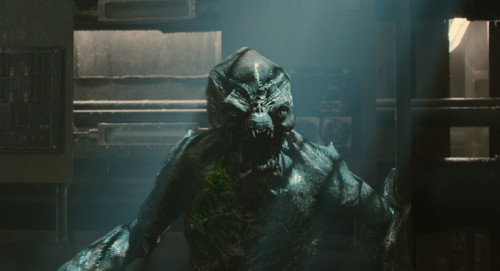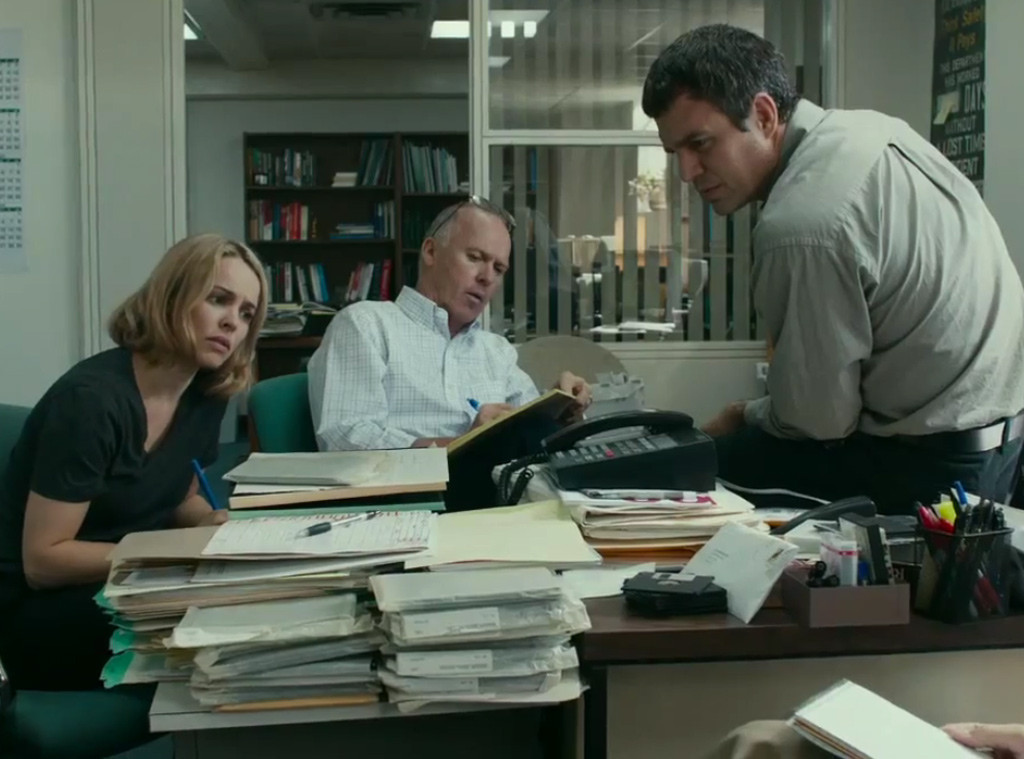Genre: Thriller/Serial-Killer
Premise: A killer exploits society’s over-reliance on mobile technology to pick off his victims one by one.
About: Today’s writing duo is one of the hottest in Hollywood. They shot onto the scene with their heavily hyped debut spec, “Die in a Gunfight” (straight out of college, no less). Unlike a lot of writers who get a sale and disappear into obscurity, they parlayed that sale into a few writing assignments, eventually landing one of the coveted Marvel projects (Ant-Man). That job has led to a job on Transformers 5. Make fun of Transformers all you want (I do) but landing a writing job on a summer franchise film is a huge freaking deal. Low Tide is a script the writing team sold to 20th Century Fox last year. This is a more recent draft.
Writers: Andrew Barrer & Gabriel Ferrari
Details: 121 pages – 3/21/15 draft
What in the sam hell?? We’ve got a sequel-free, remake-free, biopic-free, not a true story, based-on-absolutely-nothing official spec screenplay here! If I weren’t such a cynic, I’d say that we’re reviewing a piece of original fiction. It’s been so long since I’ve actually done that, I’m not sure I’m qualified to do it anymore.
The way the spec market has gone, the buyers want you to stay in HARDCORE genre lanes. Like “Bed Rest,” which sold to MGM last month. That’s a clear horror genre flick that can be marketed right out of the Final Draft box. I was just reading an article about Robert Zemeckis’s new film, The Walk, and he said that every single production company and studio in town turned the project down. When asked why, he said, simply, “It doesn’t fit into any slot, if you know what I mean.” That’s the way this business works. So for Barrer and Ferrari to go against the grain and give us an offbeat serial killer flick, you gotta give’em knuckles.
But The question that kept popping up while reading Low Tide was, how far off the beaten path can you take a genre? Did these two go too far?
30-something Shae White is not your average detective. Not only did she lose her sister in a murder-suicide when she was just a girl, but she spends her off-time going to sleazy Atlantic City hotels and banging strangers with the explicit rule-set that they tell her they love her, despite her wanting nothing to do with them afterwards. She even keeps the dirty panties from the sex-sessions in a giant drawer in her bedroom. Hash-tag naughty.
Shae is assigned to a strange case where her daughter’s future boyfriend is attacked by a shark and loses his leg. When the police go fishing for the leg, they instead find another leg, that of a recently deceased female.
When the police find the rest of the female, they learn she was murdered, but they decide not to share this detail with the public in fear of wiping out 4th of July tourist traffic on the Jersey Shore.
Shae teams up with another detective, Pete, and the two discover that a man named Robin Goodfellow is texting young women from the fake accounts of their lovers in order to lure them into murderous situations. Goodfellow is sort of a cross between Jigsaw, Scream-Villain, and Hannibal Lecter, a philosophizing recluse who enjoys playing people for chess pieces.
It isn’t long before Goodfellow begins targeting Shae, texting her and calling her with an untraceable fake electronic voice. But Goodfellow may be targeting someone above his pay grade this time. Shae gradually puts the clues together and finds our psycho recluse, leading to a showdown that will leave only one of them able to keep texting those “lol’s.”
There’s a part of me that respects what Barrer and Ferrari have done here. One of the hardest things about screenwriting is walking that fine line between embracing traditional screenwriting structure, and adding just enough messiness to keep your script unique.
This is often what leads to that coveted “voice” we hear so much about but rarely understand. The way in which you break those well-worn rules is what makes your voice different, is what makes your work feel like you. But here’s where the “fine line” thing comes in. Those detours only look good if they work. And I’m not sure they worked in Low Tide.
Right from the start, I had a hard time finding my footing. We start with a cool scene where a girl gets a spooky text from someone while with her boyfriend. The text says only, “He knows.” It turns out our girl has been unfaithful, and now she’s in an isolated area with a guy who, if the texter is to be believed, plans on harming her. So she runs, and it doesn’t end well.
We then go to a woman throwing her dirty panties into a post-sex dirty panty pantry. We then jump to a girl who may or may not be her daughter (it isn’t made clear) who watches as the boy she has a crush on gets his leg bitten off by a shark. We then watch the police fish out the boy’s leg and bring it to the hospital to be reattached, only to realize it’s a different leg. We then find the source of this different leg – the now-murdered girl from the opening.
I suppose it sort of makes sense but it was all so disjointed that 30 pages in, I still didn’t know where the script was going. Eventually our killer, Robin Goodfellow, is introduced, and he provides some connective tissue to all this madness, but Low Tide spent the majority of its tide just trying to make sense.
I mean I’m still not clear on how Goodfellow kills his victims. He doesn’t do it himself, since he stays in his little room the whole time. I guess this means he recruits others to do it. But that’s pretty far-fetched, the idea that you can recruit random people willing to partake in your weird text and fake-electronic-voice phone murders.
That wasn’t the only sloppy part. One of the ways you can tell a script’s not working is if key characters disappear for long chunks of time. This indicates the writers weren’t thinking things out ahead of time or don’t know what do with the characters. Nancy, Shae’s daughter, gets a couple of key scenes early on (saving our shark-attacked boy), and then disappears for 40 pages at a time.
I know there’s an ongoing war in the screenwriting community between outliners and non-outliners, but this is where outlining really helps. You can see exactly where characters need more time and where they don’t.
The movie inspirations here were also too heavy. The shark attack and subsequent “hidden from the public to keep profits up” storyline was ripped straight out of Jaws. The electronic voice stuff was taken straight out of Scream. And our serial killer manipulating our female lead was too similar to Silence of the Lambs.
Look, it’s hard not to include plot points and characters from our favorite movies. That’s why we became screenwriters in the first place. Because we love movies! But the way you want to approach imitation is the way actors study subjects they’re going to play. They don’t ape their mannerisms or do impressions of those people. They take the ESSENCE of the person and let it inspire their own unique performance.
Take the ESSENCE of what you see in the filmmakers and writers you enjoy and apply that to your script. Avoid applying direct plot points and characters. I particularly see this problem with young screenwriters. For whatever reason, they’re more prone to bring in stuff from the movies they love. Veteran screenwriters actively look to create their own storylines and strive to be different from their predecessors.
The good news is, these two are visual writers. They’re definitely thinking about what’s going to be up on that screen. And that’s important. A woman stalking around in a sex-dungeon wearing a half-destroyed Pinocchio mask while an electronic voice taunts her is major trailer material.
And Shae’s weird sex addiction was compelling as well. The whole insisting on people telling her they loved her, while actively avoiding love, while also keeping this bizarre panty memoir. That had me wondering what this woman was going to do next. If you can write characters that have readers turning pages because they want to know what they’re going to do next? That’s a rare talent.
But in the end, this felt too patch-work for me. And I couldn’t get over the stuff taken from other movies. These guys are definitely talented and have a unique voice. But you can’t be unique if you’re blatantly bringing other movies into your story. I’ll be interested to see what you guys thought. There’s a bit of True Detective in Low Tide’s DNA. And I know you all loved that show (me, not so much!). This cold be one of those “Carson hates, but everyone else loves” scripts??
[ ] what the hell did I just read?
[x] wasn’t for me
[ ] worth the read
[ ] impressive
[ ] genius
What I learned: Don’t write like a virgin. – There’s an old saying that pops up every once in awhile: “Kiss like a virgin.” It refers to the over-the-top, heavy lip and tongue, intense over-compensating kiss you give when you haven’t had sex yet. There’s an equivalent in screenwriting. “Write like a virgin.” This is when writers use big words, throw in a lot of heavy “look at how smart I am” philosophizing by characters, rounded up with lots of references to historic literary titans (both Twain and Nietschke get some love in Low Tide). This kind of writing, if overdone, makes the writer look insecure. The veteran pros know that it’s all about story. They don’t need to prove their worth in every line. If the sentence, “He walks over and grabs his wallet” is all that’s needed for the moment, despite it being an overly-simplistic presentation of the action, that’s what they’ll use. I wish Barrer and Ferrari would stop trying to prove how much they’ve read or studied or how many big words they can use and just write. They’re talented guys. Why all the fireworks?
Hope everyone’s enjoying their weekend. Just one week away from the 250! Writers who made it into the coveted top quarter-thousand will be notified by the end of next Saturday. In order to distract you from that looming announcement, here are some amateur script entries to get your bloody analytical hooks into. As always, let’s find something good! Scriptshadow points to the first person who guesses my favorite logline of the pack (if you’ve been a longtime Scriptshadow reader, this should be easy). I’ll reply to the winner. :)
Title: She Wants to Have My Babies
Genre: Rom-Com
Logline: A perfect couple’s relationship becomes a rollercoaster when she wants a baby and he flat-out refuses to start a family.
Why You Should Read: The baby conflict. Now who doesn’t know a couple that struggle(s/d) with this issue? You – yes you – who answered “me”, go back to your cave. Now you, in-touch people, do you think such an emotional topic can be dealt with humorously considering the stakes? No, don’t answer. Can’t you recognize a rhetorical question when you see one? Now after you read “She Wants to Have my Babies”, and only then, will you be allowed to answer my question based on your experience of the read. You will be welcome to in fact. I know, I’m a prince.
Title: Shotgun Wedding
Genre: Action / Comedy
Premise: A timid guy from a small town gets cold feet on the eve of his wedding and incurs the wrath of his bride’s unhinged religious family.
Details: 91 pages
Why You Should Read: I love fun, quirky movies with plenty of silly jokes and cool action scenes, and Shotgun Wedding is chock full of both! It’s tone and sense of humor has been compared to films like Raising Arizona and Hot Fuzz. It’s a light, entertaining read and would definitely be a crowd pleaser on the big screen. Thank you for your consideration and I hope you enjoy my script.
Title: Game of 72
Genre: Sci-fi
Logline: In a future where robots run grisly human-fighting rings for sport, any human who survives 72 matches is given 72 minutes to win their freedom–or die.
Why You Should Read: I moved to Los Angeles to specifically pursue a career in waiting tables. I was originally gonna write a biopic about Nikola Tesla’s chef, but figured this would be more interesting. This script has such a big fat concept, that when it took a selfie, Instagram crashed. Do not read it if you hate: space, hyper loops, nihilism, invisible architecture, and futuristic theories. FULL DISCLOSURE: I’m an alien that’s trying to blend in with everyone.
Title: #uCantMakeThisUP
Genre: Psychological Thriller
Logline: After a sour exchange online, a military wife must protect herself and her daughter from an anonymous poster’s offline threats.
Why You Should Read: I wanted to explore a section in horror without the supernatural bent, thus UCMTU was born. I’d pitch it as a character-driven piece that’s grounded in realism. I believe it checks off the list of things needed to sale: Female Protag; Thriller; Present-Time; and Few Locations (HELLO BLUMHOUSE!!!). Any feedback to help strengthen the script is appreciated.
Similar films: Catfish, Unfriended, Ex Machina.
Title: EXTRACTION
Genre: Action/Sci-Fi
Logline: Two military veterans with PTSD scan an abandoned war zone for technology that will remove their war experiences. But other forces are at play…
Details: 108 pages
Why You Should Read: I’ve been destined since I was in elementary school to write screenplays. It was a combination of watching kung-fu flicks with my grandfather, and writing 90 paged graphic novels that were side-sequels to the movie “Twister.” Since studying screenwriting in college, I’ve been hammering away at the craft for almost ten years now, and 24 scripts later I can say I’m closer than ever to finding my voice, and the feedback has been consistently good. I’ll be taking a trip to LA soon to meet film industry friends, and feedback from scriptshadow will certainly let me know what I need to get to the next level. I hope you’ll find something to enjoy here! Love the site.
Genre: Comedy/Sci-fi
Premise: A pregnant woman’s world is turned upside-down when a group of hungry aliens invade her suburb.
About: “The Shower” finished with 10 votes on last year’s Black List and just recently got everyone’s favorite thespian, Anne Hathaway, to sign onto the flick. While screenwriter Jac Schaffer may not be a well-known commodity to most, her first film, Timer, which she wrote and directed, became a surprise hit on Netflix. This put her on the Hollywood map, getting her more reads for her next script (this one), which helped get her on the Black List, which helped get her script in front of Hathaway. Which is what turned this into a Go Picture. That’s how you do it, boys and girls!
Writer: Jac Schaffer
Details: 102 pages (March 26, 2014 draft)
Are writers even allowed to write male-driven comedies anymore? It seems like the unofficial rule is that if it’s a comedy, it needs to star women. And hey, why not. We have 75 years of comedies starring men and, to be honest, we haven’t broken a lot of new ground lately.
But here’s my beef with this trend. I don’t like it when studios make female-driven comedies just to make female-driven comedies. Like this Ghostbusters thing. There is NO STORY REASON to make all the Ghostbusters women. It’s a straight-up lazy choice brought on for no other reason than to have an all-female cast.
At least with The Shower, the concept is female-specific. It’s about a pregnant woman in the midst of a baby shower she never asked for. You can’t do that with men. But does this make the script any better? That’s a question I’ll be answering after the commercial break.
30 year-old Mary Kopecki is 32 weeks pregnant, which I guess in the female world means she’s due for a baby shower. Ironically, Mary is the last person who wants a part of this shower. Her pregnancy is a unique one, in that after her divorce, she decided to go the whole artificial insemination route.
It’s her best friend Erin, married and BABY-LESS, actually, who’s the most excited about this shower. You can tell that Erin is dying for her husband Chuck to impregnate her so they can start a family herself. The only problem is that Chuck is the world’s biggest asshole, and everyone seems to know this EXCEPT for Erin.
Rounding out the 3-chick crew is Liv, who’s described as, “if Bill Murray were trapped in the body of a hot girl in a leather jacket.” Liv is the most progressive in the group, and you get the feeling that if Liv found out she was menopausal tomorrow, she’d do some blow, some shots, and wake up the next day with a smile on her face.
The three friends are performing typical shower duties when all of a sudden, boom goes the dynamite. A meteorite lands in the backyard, and when Erin’s dog inhales its gases, it turns into a hulking crazed killer dog-alien that starts chomping off chunks of shower guests’s flesh.
The girls jump in their car and try and drive away, only to find these meteorites crashing all over the place. While Erin tries to find her husband, Chuck (who ends up being at a strip bar – surprise surprise), they realize that the alien gases infect women, who then pass the gas off to men, who then turn into hulking alien creatures, who in turn kill anyone they can find.
For a woman who’s already having doubts, this event puts a lot of stress on Mary, who must come to terms with whether she’s really ready to have a child or not.
The Shower reminded me just what a coup Bridesmaids was. Because here’s what I learned reading this script. When a script is TOO female-specific, it alienates the male audience. While I’m sure women find something relatable about pregnant women always having to pee, or that they poop during delivery, those experiences are a bit foreign to me as a male (not to mention, disgusting), and therefore not exactly funny.
With Bridesmaids, they took a female-specific experience (that of being bridesmaids) and still created comedy that appealed to both men and women. Everyone can relate to the half-crazy weirdo friend (Melissa McCarthy’s character) who is socially unaware on every level. That’s funny no matter what sex you are. I’m not sure ankle swelling jokes are going to do it for most male audience members.
Speaking of the female slant here, there’s a bit of man-bashing in The Shower. The most dominant male character is Chuck, Erin’s husband, and he is literally the worst human being on the planet. He’s a total fucking dickhead. And the only other male, who’s actually nice, is a stripper! Believe me, I’m sick of reading tons of male-authored scripts where NO EFFORT was given to building depth into the female characters. But it doesn’t make female writers look good when they do the same thing.
That’s not to say I’m shower bashing here. There were some things I liked about the script. We always talk about the importance of creating UNRESOLVED REALTIONSHIPS in your screenplay. Unresolved relationships not only infuse conflict (the life-source of drama) into the script, but also drive your second act. You’ll find your script dying quickly in Act 2 if you don’t have plenty of unresolved relationships to explore.
But what I really love is when writers get creative in this area. Which is why I loved that Schaffer created an unresolved relationship with a character who wasn’t even born yet! Yes, one of the critical relationships in the script is the relationship between Mary and her unborn baby. It’s clear that she’s not ready to have this child, and watching her battle those feelings was one of the high points of the story.
And it was a brave move! This is a wacky sci-fi comedy you’re writing here. Yet you have the balls to suggest that our main character is disgusted by the child growing inside of her? That’s kind of badass.
Schaffer also included a clever little twist in how she constructed the aliens. It’s actually the women who exhale the alien gas into the men’s mouths, making the men “pregnant,” which is how the aliens are born. A script always looks better when you can tell the writer went that extra mile and thought about their concept. That addition proved to me that Schaffer wasn’t throwing random shit on paper here.
In the end though, despite really wanting to, I couldn’t get into this. That was mainly due to the humor being heavily slanted towards women. But also, the jokes weren’t that sharp on a general level. But this should appeal to the xy crowd. And Hathaway is a good choice to play Mary.
[ ] what the hell did I just read?
[x] wasn’t for me
[ ] worth the read
[ ] impressive
[ ] genius
What I learned: Pregnancies are number 2 on the “perfect ticking time bombs for movies” list, right behind weddings. Make a key female character ready to pop and you have your timeline built into the story for you, which should give your script lots of urgency. I know writers are terrified to include either of these options, less their script be considered “cliche,” but in a comedy, where the plot usually isn’t the star of the script, readers won’t bat an eye at either of these options being used.
Today the “spotlight” is on a new Liam Neeson thriller. But can Carson recover enough from yesterday’s script to enjoy it?
Genre: Thriller
Premise: A commuter gets a phone call informing him that if he doesn’t find a specific man on that train before the last stop, his wife and daughter will die.
About: I remember when this script hit the scene forever ago. Like a lot of scripts in Hollywood, it made some noise and then disappeared into the ether. What’s crazy about this town, though, is that if you don’t give up, if you keep improving and pushing the stuff you believe in, sooner or later, something good comes of it. And that’s exactly what happened here. The Commuter has caught the attention of one Liam Neeson, who’s just turned this into a Go picture. Writers Byron Willinger and Philip de Blasi have patiently waited 7 years, not securing a single credited writing assignment in TV or film in the meantime. And now, finally, their lives are about to change. Don’t you love this business?
Writer: Byron Willinger & Philip de Blasi
Details: 101 pages (3/28/08 draft)
In retrospect, could a script titled “The Commuter” have starred anyone other than Liam Neeson? It’d be like naming a script, “Quick Kill,” and expecting anyone other than Jean Clade Van Damme to be the lead. Neeson seems to be tailor-made for these one-word vague action-esque titles. But is the world getting sick of the “Neeson setup?”
I mean, in Non-Stop, Neeson gets a series of texts telling him he has to act or something terrible will happen. Here, he gets a series of calls telling him he has to act or something terrible will happen. Does that make this an unofficial sequel? Is part 3 that Neeson receives a series of tweets that he must act or something terrible will happen? “Liam, you must visit 100 websites before the end of the hour or death. #hurry.”
Truth be told I needed this script after yesterday’s monstrosity. I still don’t know why people are defending Spotlight like it’s some amazing script. There isn’t a single good moment in the script that isn’t purely due to the true story it’s based on. In other words, every good part is a part the writers had no choice but to include. As for everything else, stuff that needed to be writer-generated (like character exploration and character conflict) there was NOTHING. Ugh. I so needed some empty commutering to move past it. Please be good straight-forward Liam Neeson thriller. Please be good.
Michael Woolrich is a former cop famous for solving one of the city’s most notorious murders. But he’s moved past that life for reasons we’ll find out later. Now he works a calm office job, gets to spend a lot more time with his wife and daughter, and he’s happy. In fact, he’s going out to dinner with his wife tonight.
All he has to do is do what he does every evening. Get on the train and travel back from the city to the suburbs. Seems innocent enough. Well it ISN’T INNOCENT MOTHERF&^%ERS. Cause Liam Neeson is in this movie. And when Liam Neeson takes transportation somewhere, something always happens.
Indeed, Liam – I mean Michael – gets a call informing him that he needs to find someone named “Devlin” on the train before the train gets to its last stop. Apparently, there are two Feds at the last stop, waiting for Devlin to show up, because he witnessed a big murder. Once Michael finds Devlin, our phone-caller (and his mysterious crew, who are also on the train somewhere) can kill him to make sure he doesn’t tell the Feds what he knows.
Being the star detective that Michael is, this should be easy. The problem is that Devlin is an alias. And Devlin doesn’t WANT to be found. So this is going to be a little more challenging than your average investigation.
Throughout the 60 minute train ride, Michael will misidentify several Devlins, make some horrible mistakes, get booted off the train, and almost get his family killed several times. When he finally does figure out who Devlin is, mere minutes before the train reaches its destination, he will have to make the most difficult decision of his life. Should he kill Devlin himself to save his family?
The Commuter is bit like a game of monopoly. When someone mentions you should play, you hem and you haw and try to get out of it, but 45 minutes later, you’re excitedly rolling the dice, hoping you land on Boardwalk so you can take everyone’s money. This little script really does grow on you.
I think that’s because I had no fucking idea who Devlin was. Usually in these simplistic thriller “mysteries,” you know the killer before we’ve gotten out of the first act. But as Michael continues to bounce around well into the second act, you realize you don’t have the slightest clue who Devlin is.
If there’s a takeaway from this script, it’s that. If you’re going to write a simplistic thriller premise, then you better be WAY THE HELL AHEAD OF YOUR READER. Because if the reader gets ahead of you in a script like this, they’re going to be sooooo bored. There simply isn’t enough complexity in a plot like The Commuter’s to withstand a lot of other script issues.
I must admit, though, that I’m tired of the “random person calls and tells the protagonist he must obey” plot device. Starting all the way back with Die Hard 3, moving into Phone Booth, and more recently with, well, a dozen films over the last decade – there’s something lazy about it. It doesn’t take a whole lot of creativity to come up with the setup.
A man is on a Cruise Boat and gets a call that unless he commandeers the ship within the next 45 minutes, everyone on the ship will die.
See, I just did it.
Maybe it’s because the main character becomes a reactive pawn. They’re not pushing the movie forward. They’re following orders. I mean, how much more badass is John McClane in the original Die Hard as opposed to Die Hard 3 where he’s running around like a chicken with his head cut off, doing whatever this loser tells him to do? And that’s because when you’re following orders, you’re a reactive little bitch. It’s not hero-ish.
So again, if you’re going to go with this setup, you better be ready to execute. You better have a mystery that’s truly a mystery, and not just a “passing-the-time” Screenwriting 101 plot outline that any screenwriter could come up with.
Commuter shows off its metal when we finally find out who Devlin is. It forces our main character to make an IMPOSSIBLE choice. And that’s always good writing, when the writers put the main character in a situation where there is no right answer, where even the audience isn’t sure what they would do.
There were other nice touches here as well. In the B-storyline, which is the bad guys kidnapping Michael’s wife and daughter to motivate him, I liked how they didn’t already have the wife and daughter when they first made their threat. They were merely AFTER the wife and daughter.
So early in the script, we see the wife and daughter shopping, and then one of our bad guys watching them, planning how he’s going to kidnap them.
The reason this is such a smart move is because it adds uncertainty to the B-plotline. We’re still hoping that, against all hope, the wife and daughter might be able to escape. When you create uncertainty in a plotline, you get more mileage out of it. If, when the bad guys originally called Michael, they already had the wife and daughter in the basement, well, there isn’t a whole lot of uncertainty or hope in that storyline now is there? Its dramatic potential is at the end of the line. So yeah, I like how they gave us another exciting plotline to jump to.
And the script throws in a few nice surprise twists as well, specifically on the character front. One of my big beefs with Spotlight was that we knew NOTHING about the characters. They didn’t even try to make them real people, despite the fact that they were real people! And yet here, with Michael, a completely fictional person who’s never existed in the real world, we learn a HUGE revelation about his past that makes us rethink his entire character.
Do I think The Commuter is going to challenge Spotlight for an Oscar anytime soon? Of course not. People vote for movies like Spotlight because they’re important movies telling an important story. But if you’re looking to be entertained and thrilled, The Commuter will do the job.
[ ] what the hell did I just read?
[ ] wasn’t for me
[x] worth the read
[ ] impressive
[ ] genius
What I learned: Guys and gals, stop describing your characters with some variation of the description: “She looks worn down and tired, but you can still see her once-prominant beauty underneath.” “Tired/worn-down but still beautiful” is one of the most overused description-types I see. I guess it’s not the worst way to describe someone. Just know that it’s not exactly original.
It’s one of the biggest breaking scandals in the history of civilized society. But the real question is, can I stay civilized when breaking down this screenplay?
Genre: Drama/True Story
Premise: The story of how a group of reporters at the Boston Globe exposed the Catholic Church pedophile scandal.
About: Can the man who directed “The Cobbler” direct an Oscar-winning film? That’s the question of the day since Tom McCarthy co-wrote and directed “Spotlight” after the Adam Sandler Netflix classic. Josh Singer co-wrote the film with McCarthy. Singer’s resume includes stints on The West Wing and Fringe, with his lone feature credit being about international narcissist Julian Assange. Spotlight is peppered with a cast that makes my man-panties drop. Mark Ruffalo, Michael Keaton, Liv Schreiber, Rachel McAdams, Billy Crudup, Stanley Tucci. I just want to lick those names, they look so yummy. You can lick them too, on November 6th.
Writers: Josh Singer & Tom McCarthy
Details: June 5th, 2013 draft (132 pages)
I suppose it’s appropriate that we’re warming up for Oscar season since it was freaking 99 DEGREES OUT TODAY. Dammit-to-Tinley-Park. Holy hell. I’ve seen cooler days inside of a Chicago pizza oven.
Despite the heat, I’m always lukewarm this time of year. Because let’s be honest. Half the Oscar wannabes believe the key to getting nominated is to put a bunch of serious-looking men in rooms talking about serious things.
They forget that the number 1 ingredient to a good movie is to ENTERTAIN. I’m reminded of Zero Dark Thirty a couple of years back. It was the prototypical, “Serious-looking men in rooms talking about serious things” film. I’m not sure anybody working on that film ever asked, “Hey, do you think people are going to enjoy this?”
And Spotlight is the prototype for “Serious men talking about serious things” films. I ain’t hatin on you, Spotlight. But dude. You gonna need to add some color to your wardrobe if you want audiences to let you into their apartment.
Whether you have a noble message or not, nobody cares unless they’re entertained. Let’s see how well Spotlight achieves this.
Spotlight’s fifteen thousand protagonists are led by two in particular, Mike and Robby. The two worked for the Boston Globe back in 2001, and start investigating a rumor that there are pedophile priests in the Catholic Church.
Their research is encouraged by the Globe’s new editor, Marty Baron, a Jewish man who just took over the job from a stalwart Catholic.
Mike and Robby are joined by many other journalists including Matty and Sacha and Ben. Our only hope of remembering who’s who lies in the fact that Sacha is a woman. That leaves us with a fighting chance to distinguish the remaining four.
Through his research, Mike finds out a local lawyer used to help the church settle a lot of pedophilia matters behind closed doors – as in, the state wasn’t even involved. This was the first sign to Mike that something big was up.
After putting out some feelers, Mike learns that priests raping children isn’t the only part of this scandal. It turns out the head of the Catholic Church KNEW this was going on, and actively created a system to deal with these matters, which amounted to sending the offending priests to other churches, where they would just abuse more boys.
Mike’s main challenge is to find the public record that will ‘smoking gun’ this story. Because if it’s just a bunch of conjecture, the church will say it’s a lie and the nation will believe them. You have to remember, they have the man who created the universe on their side. That’s pretty persuasive.
Somehow, Mike finds out about a lone public record file that confirms everything. The question is, can he get it before the church finds it first? Because if he doesn’t, the story is dead and gone forever.
While reading Spotlight, I found myself asking a very specific question: “Can a great story survive bad writing?” Because this scandal is, without question, a great story. You have a gigantic institution covering up a huge scandal. You have hypocrisy on the highest level. You have thousands of child victims. This kind of story writes itself.
Unless, that is, the writing is so bad that the amazing story gets buried. And that’s what happened here. I don’t even know where to begin. I guess we’ll start with the character count.
There were probably 60 characters introduced in this script. That’s 1 every 2 pages. This made it impossible to keep track of what was going on. Our characters would be flabbergasted on page 60 by the actions of a character that hadn’t been mentioned since page 15. Every time a name came up, you were saying, “Wait, who is that again?”
And I get that this isn’t a problem onscreen when you can see faces. But the laziness in which characters were introduced here was so bad, it felt like they weren’t even trying. Robby, for example, is introduced in a bland setting with the description: He’s a “Boston everyman.” WTF DOES THAT MEAN? How does that tell me ANYTHING about who he is?? I didn’t even know he was a reporter until I saw him working at the Globe 20 pages later.
Mike was introduced the same way. His big introductory scene is walking into a slummy apartment. What is this supposed to mean, exactly?? What does this tell me about Mike?? I didn’t know if Mike was an out-of-towner who just moved into this apartment, if he’d been kicked out of his house by his wife and had to stay here in the meantime. I didn’t know what he did for a living.
That’s what really bothered me. When you write characters, good writers know that the first thing you do – ESPECIALLY in a script with a ton of characters where it’s easy for the reader to get lost – is to introduce that character in a setting that tells us WHO THEY ARE. Look at how Jules and Vincent are introduced in Pulp Fiction. You know exactly what those characters do and who they are after that first scene.
There wasn’t even the tiniest attempt to clue us into who these people were when we met them. This forced me to make educated guesses throughout and only later put the pieces together on who this person was in relation to the story, well after key plot points regarding that character were mentioned, forcing me to mentally rewind and try to remember what those plot points were, now that I knew they were relevant.
Ironically, introducing any characters here was pointless. Because there are no characters in Spotlight. Oh sure, there are people who are pulling us through the story, but there are no CHARACTERS. Spotlight is one big investigation where we don’t know the difference between ANYONE.
I couldn’t mention one quality that was different between Mike and Robby. They were the same person – two reporters investigating a story. This extended to all the characters throughout Spotlight. They were all bland automatons trying to get a story for the Globe.
Why is this a big deal? Well, one, we don’t care about people we don’t know anything about. But the thing with character is, the more you know about a person, the more you can use that to connect plot and character.
For example, why don’t we have a single reporter here who is a diehard member of the Catholic Church??? That would’ve made them infinitely more interesting. Of course a character with no connection to the church is going to go after it. But if a reporter had, for example, an extremely religious wife? If their family went to church every Sunday? That person is going to be much more conflicted when it comes to investigating this story. That’s how you connect character and plot. But no attempts like that were ever made here.
And believe me, they had plenty of opportunities. The new editor of the Globe is Jewish. That was ripe for all sorts of conflict. Do the hardcore Catholics point to this editor as having an agenda? Do they pin all these accusations on that agenda? Does that begin to test the investigation? Does the editor start to back off as a result?
No. We don’t get anything like that. In fact, there is so little conflict in a story that might be the most conflict-filled of the past 20 years, you wonder if McCarthy even knows what conflict is.
There’s not even a real villain here. There’s this guy Cardinal Law, who’s mentioned a lot and who we see briefly a few times. But it’s always from afar. This guy could’ve infused this story with a shot of heroin if he started pressuring the paper to back off. We get none of that!
Why didn’t someone from the paper have a child who went to church? Who was directly in the line of fire. It’s as if the church and the paper lived on two completely different planets. Which was SO the wrong approach to take here. Connect your damn stories. Create more complexity between your elements. Why is this investigation so easy for everyone doing it???????
I don’t know how this movie’s going to play out at the box office. The real life story it’s based on is so good that I’m sure people will want to see it. I just think you’re going to have audiences leaving this film and feeling empty, not because it isn’t delivering an important message, but because after you leave the theater, you’ll realize you never knew a single character in the film.
[ ] what the hell did I just read?
[x] wasn’t for me
[ ] worth the read
[ ] impressive
[ ] genius
What I learned: Find something everybody hates, then give us the worst version of that for your antagonist. You know something everyone hates? Bullies. “Spotlight” puts the spotlight on the biggest bully you can imagine, the Catholic Church – an institution that allows its employees to rape your children and then cover it up. No matter which way you look at it, that’s going to get people riled up and wanting to see that antagonist go down. And beyond making your hero succeed, that’s the other side of the equation you want to get right – making sure the audience wants to see your antagonist go down.










